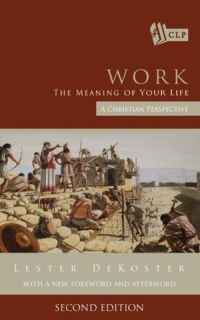In light of the latest hubbub over the minimum wage, I recently wrote that “prices are not play things,” arguing that we do ourselves and our neighbors no favors by trying to subvert and distort market signals according to arbitrary whims. Instead, I argue, we should reach beyond such low-ball thinking, focusing on creation and contribution rather than sitting and settling.
Over at Think Christian, Jordan Ballor offers some related thoughts, including a helpful reminder that while prices matter, wages do not represent a “commentary on the value of the human person as such.” Tying our self-worth to marketplace value, he argues, “can be a misleading and potentially destructive identification.”
In Work: The Meaning of Your Life, Lester DeKoster pushes heavily in this same direction, going so far as to say that although work and wages move on “parallel tracks,” “neither track is the cause of the other or the goal of the other”:
What is a just wage? It is a paycheck that recognizes the personal relationships that underlie work and civilization. Involved are both the needs of the worker – at all levels – and success of the enterprise – in which all are involved…[T]hose whose work is concerned with the creation and administration of wage and price scales must be economic artists whose jobs bear heavy moral responsibility. What the traffic will bear or wage scales that only grim necessity will oblige the poor to accept are artistic guidelines that enjoy no endorsement from heaven. The search for just wage and fair price is never-ending, for the market is always changing and so are the forms required of work. Economic justice is by no means universal even in the best of civilizations.
How, then, do they relate? If prices signal something, but that something is, as DeKoster says, “bridged by morality, not mathematics,” — or, I might add, not solely by mathematics — how does the bridging take place?
DeKoster’s response: “Executive stewardship.”
Those who set wages have an “awesome obligation,” DeKoster writes, and their conscience must balance a host of factors, all pushing toward a variety of goals, including (1) the best product, (2) the best working conditions, (3) the best wage for everyone involved, and (4) “reflecting the best efforts at every job, to be sold at the lowest price compatible with the requirements.”
 Whatever you may think of the way companies like McDonald’s compensate their employees, this task is not particularly suited to lofty economic planners and paper-pushing bureaucrats. As DeKoster concludes, it requires discernment and an active orientation of the conscience:
Whatever you may think of the way companies like McDonald’s compensate their employees, this task is not particularly suited to lofty economic planners and paper-pushing bureaucrats. As DeKoster concludes, it requires discernment and an active orientation of the conscience:
We have said that the twin tracks of work and wage do not meet, and cannot be scientifically related. They are bridged by morality, not mathematics. And it is in the self-sculpting choices of wage and price scales that managers must make the twin tracks merge — under the all-seeing eye of God. It is here that justice, as defined by the will of the Creator and revealed in his Word, comes to bear upon the economy.
The executive who seeks to avoid responsibility for his choices by seeming to let the market, or what the traffic will bear, or what necessity will oblige employees to accept become his conscience is in fact putting his choices in the service of idols—and idolatry is no more acceptable to God in board rooms and executive suites than it is in the shadowed temples of paganism…Failures occur. But conscience sets before managerial executives the goal of the ideal sketched above [i.e. best product, best wages, etc.], challenging them to make their wage and price decisions with an eye fixed on justice. Such decisions sculpt selves destined for beatitude.
Executives bear a heavy moral responsibility, and unjust wages demand an appropriate response. But good economic artistry requires capacity, and that includes an economic system with the imagination to allow for its brush strokes.
–
Purchase Lester DeKoster’s Work: The Meaning of Your Life.
To join the On Call in Culture community, like us on Facebook or follow us on Twitter.

